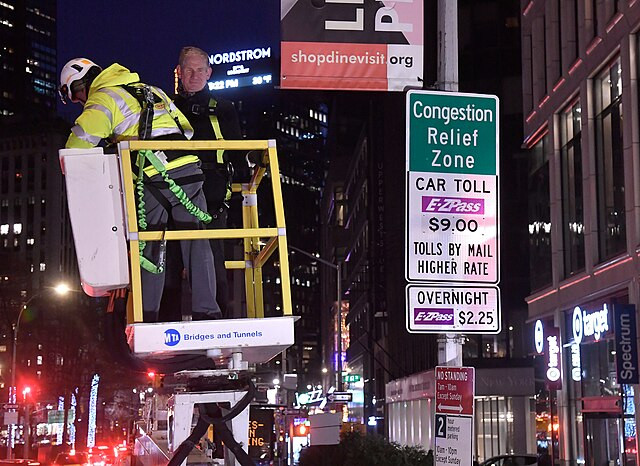New York's controversial congestion pricing program remained in operation Sunday, defying an April 21 deadline set by the Trump administration to terminate the tolling system. The $9 fee on most vehicles entering Manhattan's central business district below 60th Street continues to be enforced as legal battles over the policy intensify.
"The cameras are staying on," said Avi Small, spokesperson for New York Gov. Kathy Hochul, underscoring the state's resistance to federal pressure. The Metropolitan Transportation Authority confirmed Sunday that its system of license plate-reading traffic cameras remains active.
The congestion pricing program, which began January 5, aims to reduce traffic in one of the world's busiest urban centers while raising $1 billion annually to support mass transit infrastructure. Officials say the program has already shown results. In March, around 560,000 vehicles entered the toll zone daily-a 13% drop from the 640,000 estimated without the toll, according to MTA data.
President Donald Trump's administration has sought to dismantle the initiative. On February 19, Transportation Secretary Sean Duffy rescinded federal approval for the program, calling it "a slap in the face to working class Americans and small business owners." The administration originally gave New York until March 21 to halt the toll but extended the deadline to April 20 amid legal disputes.
Despite repeated demands, the state has refused to comply. On Sunday, John J. McCarthy, the MTA's chief of policy and external relations, stated, "In case there were any doubts, MTA, State and City reaffirmed in a court filing that congestion pricing is here to stay and that the arguments Secretary Duffy made trying to stop it have zero merit."
The Trump administration has warned of consequences. "USDOT will continue to fight for working class Americans whose tax dollars have already funded and paid for these roads," the Transportation Department said in a statement to NBC New York on Friday. It vowed to "use every tool at our disposal" to enforce the order.
Yet, the legal landscape complicates federal efforts. A Manhattan federal judge on Thursday dismissed lawsuits brought by trucking and business groups, which claimed the program lacked sufficient environmental review. MTA officials indicated that final resolution in the broader case is unlikely before fall.
Gov. Hochul, defending the policy, emphasized its effectiveness: "The program is working. Traffic is down, business is up and the cameras are staying on."
The toll charges vehicles a peak fee of $9 from 5 a.m. to 9 p.m. on weekdays and 9 a.m. to 9 p.m. on weekends. The amount varies by vehicle type and supplements existing bridge and tunnel tolls.






